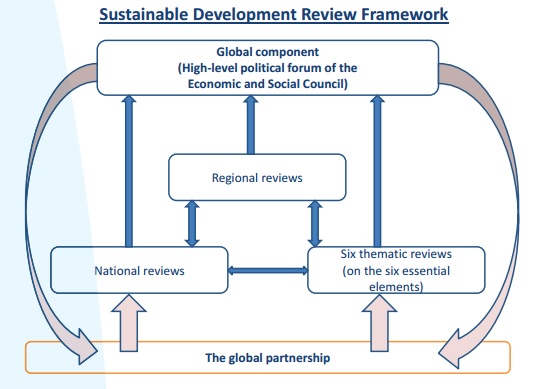News
UNCTAD’s proposal for a Post-2015 sustainable development review process

A new policy brief elaborates the objectives, guiding principles and organizational framework within the United Nations system of a sustainable development review process.
UNCTAD is proposing a framework that will help countries to deliver the post-2015 development agenda. This is timely in light of ongoing discussions in the lead up to the Third International Conference on Financing for Development (13-16 July 2015) and the United Nations Summit to adopt the post-2015 development agenda (25-27 Sep 2015).
This preliminary proposal is based on UNCTAD’s experience with both national policy reviews (in the areas of trade policy, services, trade and gender, technology and innovation, debt management, etc.) and peer reviews (investment policy, competition policy).
It also builds on UNCTAD’s direct involvement in the Millennium Development Goals monitoring exercise, as well as in the assessment by the Millennium Development Goals Gap Task Force.
It takes into account UNCTAD’s experience with the two main institutional changes in the multilateral system in Geneva: the Universal Periodic Review that was brought about with the historic change of the Human Rights Commission into the Human Rights Council in 2006 and the Trade Policy Review Mechanism institutionalized when the World Trade Organization succeeded the General Agreement on Tariffs and Trade in 1995.
Lastly, this proposal builds on the broader institutional experience within the United Nations and other international organizations, such as the Organization for Economic Cooperation and Development, and other institutional experience at the regional level, such as the African Peer Review Mechanism.
How would a sustainable development review process work?
The following explains how the UNCTAD proposal on a sustainable development review process would be linked to each component of the universal review process outlined in the Secretary-General’s synthesis report.
A country-led national component
At the country level, the objective of the sustainable development review process should be to review four basic subcomponents:
-
The progress made in the achievement of sustainable development goals (i.e. improvement against national indicators).
-
The means of implementation (including financial) available to a particular country.
-
The challenges faced by Members States, as the main actors of the sustainable development agenda.
-
The functioning of partnerships in sustaining the efforts of Member States.
This approach would contrast with that used in the implementation of the Millennium Development Goals, which focused on the indicators of progress towards the Goals, rather than the comprehensive review now proposed.
A regional component for peer reviewing
The synthesis report calls for a “regional component for peer reviewing” to be “undertaken by existing mechanisms”. Its function would be “to… identify regional trends, obstacles, commonalities, best practices and lessons learned and to generate solutions and mutual support”. The core value of a regional review process, as UNCTAD understands it, is that such a process would promote cooperation and coordination of government actions at the regional and/or subregional levels with a view to achieving the sustainable development goals. These regional reviews could take place at the level of institutions for regional cooperation, under the auspices of the United Nations regional commissions.
A thematic component to chart global progress
The synthesis report also suggests a “thematic component” that would “help to identify challenges and bottlenecks” in an issue-specific manner with a view to identifying and mobilizing actions to address such challenges. It likewise recommends that a thematic review should “… rely on relevant coordination and review ‘platforms’”, which would include “… existing specialized or functional commissions, councils or committees that convene United Nations and other multilateral entities, relevant treaty body reviews and outcomes, as well as Member States, partners from civil society, science, academia and the private sector that could monitor and advance each respective thematic area”. Such thematic clusters could be designed based on the “six essential elements” for delivering on the sustainable development goals suggested in the synthesis report (paragraphs 66-86), which are dignity, people, prosperity, planet, justice and partnership.
A global component and a component to review the global partnership
The synthesis report calls for a “global component for knowledge-sharing” as part of a periodic universal review to “discuss lessons learned in each country’s implementation of the agenda and the opportunity to review both short-term outputs and long-term outcomes related to attaining the goals”. In parallel, the synthesis report calls for another component to “review the global partnership for sustainable development”, particularly with respect to the mobilization of the means necessary for implementing the sustainable development goals at the national level.





